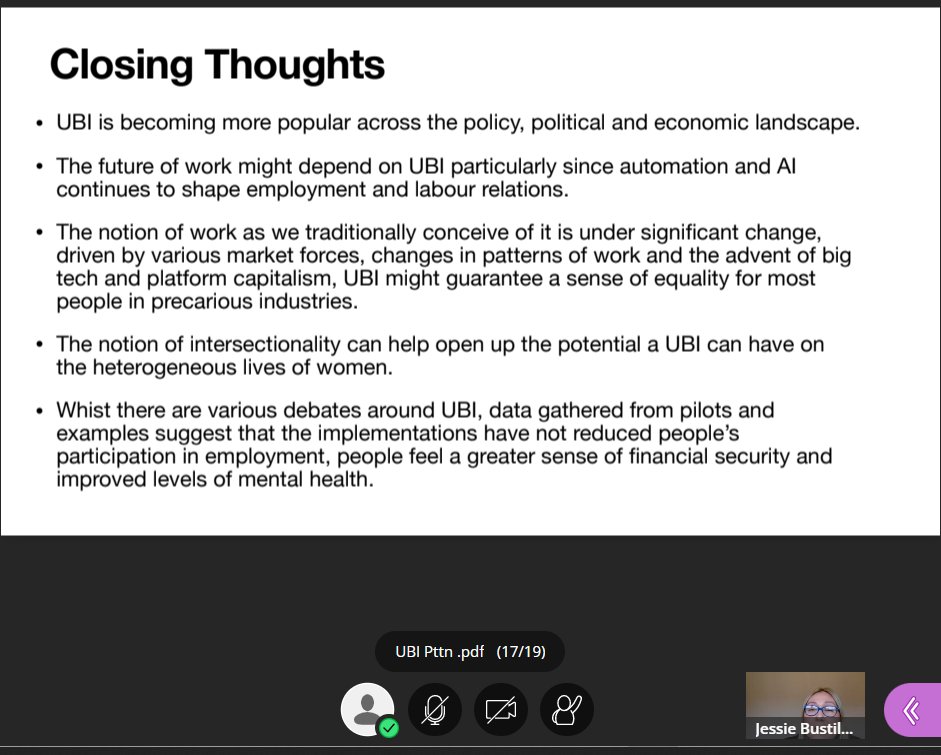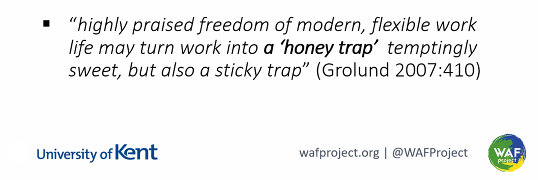
Looking forward to what should be an interesting conversation on the impact #UniversalBasicIncome could have on how we may rethink the world of work - and, in particular, the work done by 🚺 #LondonMetResearch
https://twitter.com/LondonMetUni/status/1501483009882603525
Dr @JessieJWL opens her presentation nothing that #UBI is still very much a "hot topic" amongst policymakers, particularly on its effectiveness on improving women's working lives #LondonMetResearch
Bustillos defines #UBI as "a regular cash income paid to all on an individual basis, without means test or work recruitment". Also notes it has been called a "citizen's wage", "existence income" or "guaranteed universal subsidy" #LondonMetResearch
While #UBI may be seen as some as a "far-utopian concept", Bustillos notes that UBI trials have already taken place in Alaska 🇺🇸, 🇰🇪, 🇮🇳 & 🇳🇦. Analysis shows that such schemes have increased schools attendance, while not posing a risk to people not finding work #LondonMetResearch
Closer to home, Bustillos focuses on the UBI scheme about to launch in 🏴, which will see care leavers given £1600 a month for two years after their 18th birthday to see how this support's them in their search for work when leaving the care system #LondonMetResearch
Bustillos challenges the idea that #UBI is a scheme "designed to dismantle capitalism". By contrast, Bustillos argues that UBI can have the potential to allow capitalist societies to survive & work more effectively in addressing work inequalities #LondonMetResearch
In particular, Bustillos argues that a #UBI could help people to reconceptualise "real work" (i.e. "an honest day's work for an honest day's pay"). She notes as a result in 🇬🇧, where work ethic is most prominent, the jobless are seen as "less valuable" #LondonMetResearch
Bustillos argues such narratives are "fictitious". Not taking into account people who cannot engage in "real" work due to age, disability, etc. #UBI creates "a more egalitarian narrative", where citizens are valued in society irrespective of employment status #LondonMetResearch
Turning to how UBI could help reconceptualise "work", Bustillos argues that people's sense of self-fulfilment should no longer be centred on occupying a job. A UBI could provide financial incentives for unpaid contributions people make to their communities #LondonMetResearch
Bustillos also notes that the #Coronavirus pandemic has disproportionately affected those lowest-paid sectors and people on precarious contracts in the "gig economy". We have also seen a move away from traditional manufacturing to digital & service jobs #LondonMetResearch
Bustillos also notes that this "platform capitalism" has led to the commodification of work (eg pay & employment rights). As a result, we are also seeing further offshoring of work, which can lead to higher unemployment amongst low-paid & under-educated #LondonMetResearch
Bustillos hypothesises that the introduction of a #UBI would help to address some of these challenges - it would allow people to be able to "afford" to engage in reskilling/upskilling and participating in their community #LondonMetResearch
Bustillos also argues that #UBI will help to address the division between "real work" and "invisible work". Contrasts #SocialCare staff, who are paid NLW & "family carers" who provide unpaid care to loved ones #LondonMetResearch
Turning towards the impact of #UBI on the work of 🚺, Bustillos notes that there are "ambivalent views" as to whether UBI is a good thing for all women. Those in favour argue it will contribute to female independence & rebalance gendered work inequalities #LondonetResearch
On the other hand, Bustillos also highlights arguments that #UBI would not affect the #GenderPayGap "in a meaningful way" and potentially leading to fewer 🚺 in the workplace, as 🚺 chose to stay at home and sustain themselves on UBI #LondonMetResearch
Bustillos notes that this feeds in to wider debates on the #BenefitTrap, with 🚺 more likely to find it financially disadvantageous to move off of benefits in to paid employment - largely due to 🚺 working in low-paid sectors & having caring responsibilities #LondonMetResearch
Here, Bustillos argues, is where #UBI can make a difference - empowering women to maintain their positions in work following maternity leave, especially those in lower-paid sectors #LondonMetResearch
Not only would #UBI mean that women do not lose out on income, Bustillos also argues that the UBI money could be used to buy green transport, such as bicycles, which will improve the local environment as well as opening up the local area to women #LondonMetResearch
Focusing particularly on #Caregivers, Bustillos argues this is still regarding as "women's work", which not only leads to 🚺 more likely to take on those responsibilities, but also makes it "inherently less valued that '🚹 work'" #LondonMetResearch
Bustillos argues that #UBI would help to rebalance this, meaning that a 🚺 not need to make "a sacrifice" when she chooses to care for others & recognising the economic contribution unpaid carers make to society #LondonMetResearch
However, while #UBI may improve women's financial positions, it would do little to address the social norms which contribute to women being seen solely as caregivers #LondonMetResearch
Bustillos cites the Alaskan 🇺🇸 experience - saying that the fund showed that, while women were more likely to take up part-time employment while on #UBI, there was also an increase in women taking on full-time roles too #LondonMetResearch
Bustillos calls for adopting an intersectional view for #UBI - looking at how one's different identities (class, race, age, region, location, etc.) interact with the labour market. Says focusing just on gender, for example, ignores other forms of exclusion #LondonMetResearch
The rollout of UBI, Bustillos argues, could help academics & other policymakers develop a richer understanding of the barriers faced by different groups when it comes to accessing the labour market, and ways in which they could be addressed #LondonMetResearch
Giving the 🇬🇧 as an example, Bustillos notes that women from #BAME communities are likely to experience racial discrimination, as well as gendered inequality, when accessing the labour market (eg they are not as equal both as white women & black men) #LondonMetResearch
In conclusion Bustillos notes #UBI is becoming a mainstream political theory. While there are differing views on UBI's effectiveness, Bustillos believes use of intersectionality in the new pilots will help develop a better understanding of the potential of UBI #LondonMetResearch 

The webinar now moves on to a Q&A session #LondonMetResearch
When asked if UBI will simply “pass the buck” for #CostOfLiving from businesses to Govt, Bustillos says UBI has to be seen as guaranteeing a minimum standard of living, not a solution to the crisis #LondonMetResearch
When asked about how #UBI would be funded, Bustillos repeats that it would not be offered as a replacement for the entire welfare system. However, argues UK has mature digital infrastructure, so could easily rollout such a scheme #LondonMetResearch
Bustillos also highlights how trials in other countries have given direct cash payments directly to participants, to help better demonstrate how that specific money is being spent #LondonMetResearch
When asked on the effect #UBI has on pensions, Bustillos says that trials haven’t focused on people of pensionable ages, but it would be an interesting area of future research to see how much UBI 💰 ends up in pension pots #LondonMetResearch
Final Q asks about potential dystopian fallout from UBIs. Bustillos says there is an important debate globally on who gets taxed & how it is spent. Believes #UBI would help deal with inequalities & help being vulnerable people back into mainstream society #LondonMetResearch
Really interesting debate on how #UBI could help change how we view & value work, particularly 🚺’s work. Thanks to @JessieJWL for your insights, to Prof Louise Ryan for chairing & @LondonMetUni for hosting! #LondonMetResearch
• • •
Missing some Tweet in this thread? You can try to
force a refresh






